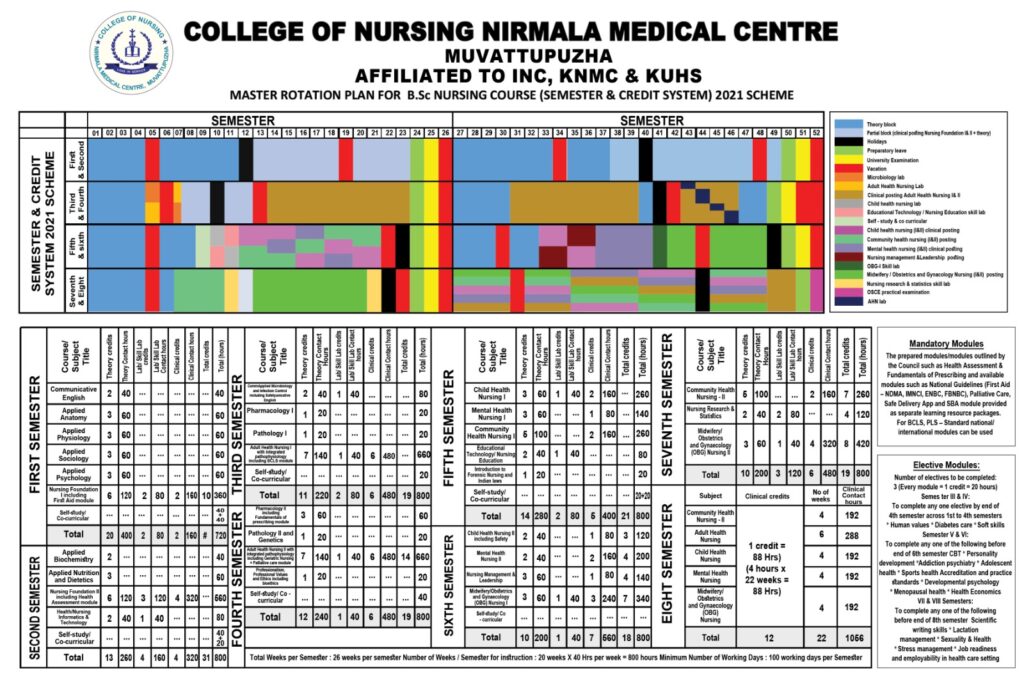BSc Nursing
Affiliated to:
KUHS, KNMC, INC
Duration
4 Years
Seats
50
Course Type
Under Graduate
Overview
Health
is a dynamic state of well-being that enables individuals to lead physically,
psychologically, socially, and economically fulfilling lives. It is a
fundamental right of all people, and individuals, families, and communities
share the responsibility of maintaining and promoting health.
Nursing
plays a pivotal role in the healthcare delivery system, significantly
contributing to health services. The College of Nursing, Nirmala Medical
Centre, aligns with national health goals and is committed to participating in
the implementation of National Health Policies and Programs. Our focus is on
identifying the health needs of the population, planning, and delivering
high-quality nursing care in collaboration with other healthcare professionals
and community groups.
The
scope of nursing practice extends to promotive, preventive, curative, and
rehabilitative care across all age groups and various healthcare settings. The
practice of nursing integrates fundamental concepts and principles from
physical, biological, and behavioral sciences, medicine, and nursing, ensuring
evidence-based and patient-centered care.
Nursing
is founded on the core values of care, compassion, and respect for human
dignity. It aims to empower individuals to achieve independence in self-care
while fostering an understanding of human behavior among practitioners. Nurses
are entrusted with upholding the rights of individuals and communities,
ensuring holistic and ethical healthcare services.
The
undergraduate nursing program at the College of Nursing, Nirmala Medical
Centre, provides a comprehensive education within an academic framework that
cultivates critical thinking, clinical competencies, and professional
standards. This aligns with the vision outlined in the National Health Policy,
equipping students for professional nursing and midwifery roles.
Our
faculty members serve as role models, fostering an engaging learning
environment that encourages inquiry-driven, self-directed learning and a
commitment to lifelong education.
The
undergraduate nursing program prepares graduates to uphold ethical and
professional conduct, fulfilling their personal, social, and professional
responsibilities while contributing to national health objectives.
Program
Duration
The
Bachelor of Science in Nursing (B.Sc. Nursing) program spans four years.
Internship-integrated practice is systematically incorporated into respective
practical hours throughout the curriculum to enhance hands-on clinical
experience.
Eligibility
Plus two with PCB combination minimum 50% mark
Candidates
seeking admission to the Bachelor of Science in Nursing (B.Sc. Nursing)
program must fulfill the following eligibility requirements:
- Educational
Qualification:
Applicants must have completed Plus Two (10+2) or its equivalent
with Physics, Chemistry, and Biology (PCB) as compulsory subjects.
- Minimum
Marks Requirement:
Candidates must have obtained a minimum of 50% aggregate marks in PCB
subjects in their qualifying examination.
- Recognized
Board: The qualifying
examination must be from a recognized board such as CBSE, ICSE, or
any state board approved by regulatory bodies.
- Age Limit: The minimum age for admission is 17
years as of December 31 of the admission year.
- Medical
Fitness: Candidates must
be medically fit, as certified by a registered medical
practitioner.
Admission
will be based on merit and may require candidates to clear an entrance
examination or interview, as per institutional policies.
AIMS
The Bachelor of Science in Nursing (B.Sc. Nursing) program aims to:
- Prepare graduates to function as competent, professional nurses and midwives, delivering promotive, preventive, curative, and rehabilitative healthcare services.
- Equip nurses with the ability to make independent clinical decisions, advocate for patient rights, and facilitate health promotion among individuals and communities.
- Train graduates to work effectively in hospitals, community health settings, and research institutions, contributing to evidence-based nursing practice.
- Enable nurses to take on teaching, supervisory, and managerial roles in clinical, public health, and academic settings.
OBJECTIVES
Upon successful completion of the four-year B.Sc. Nursing program, graduates will be able to:
- Apply knowledge from physical, biological, behavioral, and medical sciences, including alternative healthcare systems, in delivering nursing care.
- Analyze the impact of lifestyle and environmental factors on individual and community health.
- Deliver comprehensive nursing care using the nursing process in collaboration with individuals and healthcare teams.
- Demonstrate critical thinking and clinical reasoning to ensure high-quality, evidence-based nursing care.
- Integrate current trends and healthcare technologies in patient care and nursing practice.
- Provide preventive, promotive, and restorative healthcare services in alignment with National Health Policies and Programs.
- Uphold professional ethics, legal responsibilities, and nursing standards in practice.
- Communicate effectively with patients, families, and healthcare teams to foster interdisciplinary collaboration.
- Apply teaching and health education skills to individuals and groups in clinical, community, and academic settings.
- Function effectively as a team member and leader within the healthcare system.
- Exhibit leadership and managerial abilities in clinical and community health settings.
- Conduct research-based studies in nursing and integrate findings to improve patient care.
- Demonstrate commitment to lifelong learning, professional development, and the advancement of nursing as a discipline.

